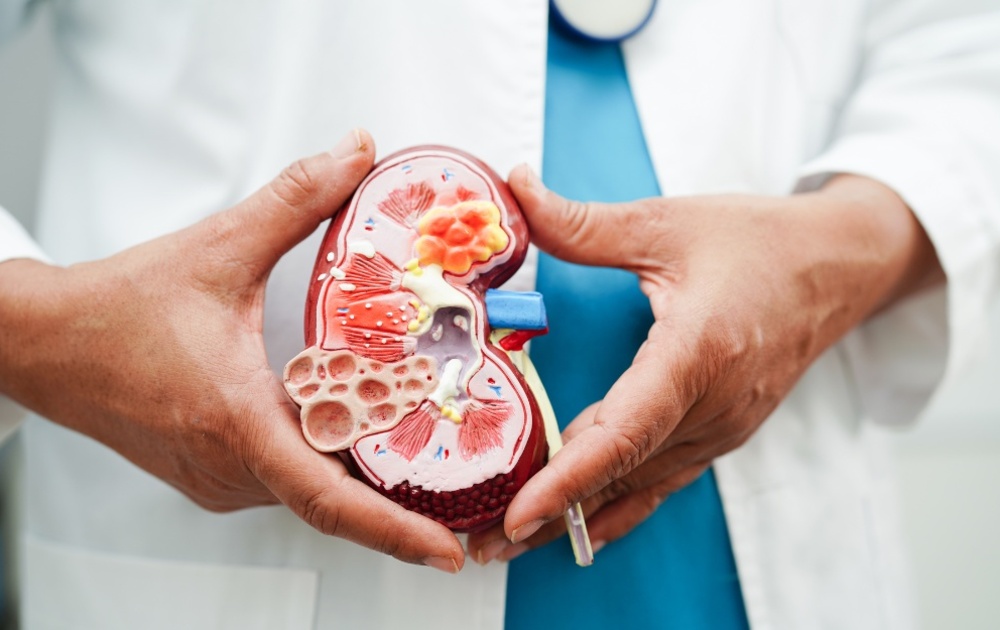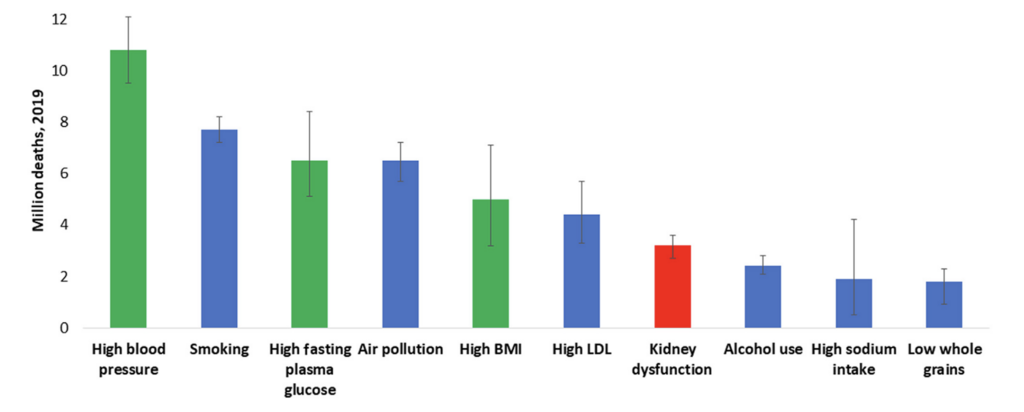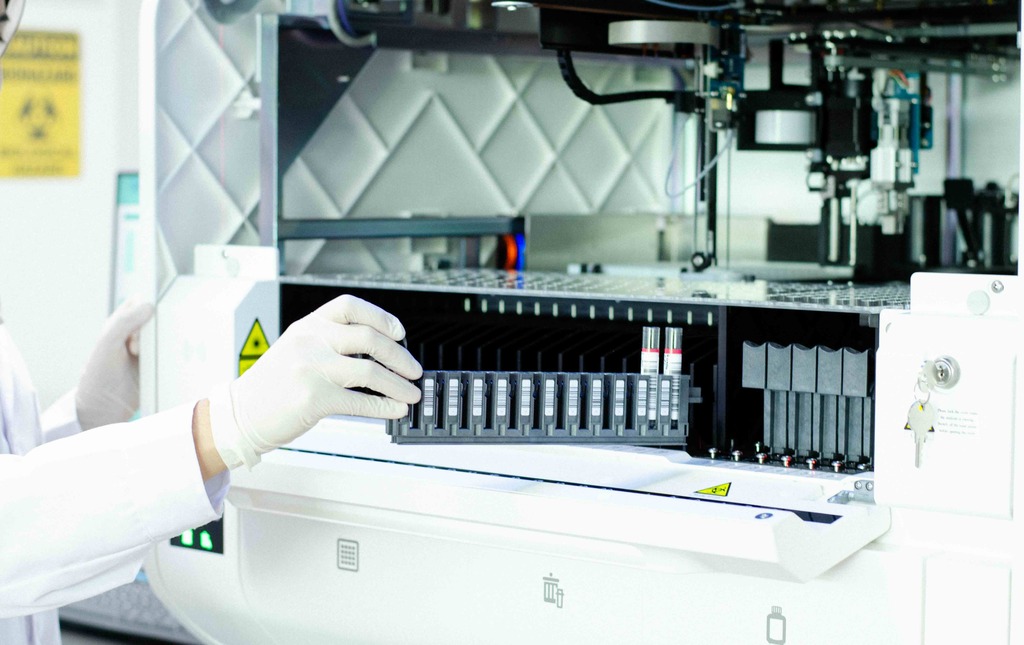BLOG
12 March 2025

World Kidney Day plays a significant role in addressing the growing prevalence of kidney disease. With millions affected globally and many cases going undiagnosed, this initiative focuses on educating the public, encouraging regular testing, and advocating for better healthcare policies to support early detection. This year's theme, "Are Your Kidneys OK? Detect Early, Protect Kidney Health", highlights the need for proactive screening to identify kidney disease before it progresses to advanced stages, focusing on encouraging individuals to recognise risk factors such as high blood pressure, diabetes, and a family history of kidney disease.
The Significance of Kidney Health
Chronic kidney disease (CKD) is estimated to affect approximately 850 million people worldwide. If left undetected and not treated timely, CKD can progress to kidney failure, leading to severe complications and premature mortality.
Clear guidelines exist for prevention and management of common risk factors for kidney disease, such as hypertension and diabetes, but only a fraction of people with these conditions worldwide are diagnosed, and even fewer are treated to target. Similarly, the vast majority of people living with kidney disease are unaware of their condition, because in the early stages it is often silent. Even among patients who have been diagnosed, many do not receive appropriate treatment for kidney disease. Considering the serious consequences of kidney disease progression, kidney failure, or death, it is imperative that treatments are initiated early and appropriately.

Figure 1: Top 10 global risk factors for death in 2019. Kidney dysfunction was the seventh leading risk factor for death.
Who Should Get Tested?
Early testing through routine blood and urine examinations can help prevent complications and reduce the burden of kidney-related conditions worldwide. Kidney disease often develops without noticeable symptoms, making regular testing essential for those at higher risk. Testing is particularly important for:
Diagnostic Tests to Check for Kidney Health
Self-care is the most important aspect of kidney care. A patient's ability to understand their health needs, make healthy choices, and feel safe and respected in the health system are important to promote healthy decision-making. Kidney function tests help detect problems early, even before symptoms appear. These tests assess how well the kidneys filter waste, regulate fluids, and maintain essential nutrients in the body.
Blood tests: The serum creatinine test measures the level of creatinine, a waste product that the kidneys should filter out. High creatinine levels may indicate reduced kidney function. The estimated glomerular filtration rate (eGFR) is calculated using creatinine levels, age, and other factors. An eGFR blow 60 mL/min/1.73m2 for three months or more suggests chronic kidney disease. The blood urea nitrogen (BUN) test measures urea levels, which can rise if the kidneys are not filtering waste efficiently.
Urine tests: The albumin-to-creatinine (ACR) detects small amounts of albumin in urine. Protein leakage may be an early sign of kidney disease, particularly in those with diabetes or high blood pressure. A general urinalysis can also identify abnormalities such as blood, excess protein, or white blood cells, which may indicate infection or kidney problems.
Overall, World Kidney Day serves as a reminder of the importance of kidney health and the role of routine testing in reducing preventable complications. Well-functioning kidneys are essential to overall health, and early detection of kidney disease can be life-saving and mitigates future health complications.
References
http://www.worldkidneyday.org/wp-content/uploads/2024/02/PIIS0085253823008633-1.pdf
4 February 2025

With approximately 19.3 million new cancer cases and 10 million cancer-related deaths reported in 2020, cancer continues to be one of the leading causes of death worldwide. The increasing number of cancer cases stresses the urgent need for further awareness, early detection, and effective prevention strategies.
World Cancer Day provides an opportunity for individuals, healthcare professionals, and organisations to reduce the impact of cancer and improve mortality rates in a collective effort, through education, lifestyle changes, and communal collaboration.
The Global Cancer Burden
As of 2024, cancer remains one of the leading causes of death globally, and its burden continues to grow, largely due to aging populations, urbanisation, lifestyle changes, and improvements in detection and reporting.
Projected New Cases (2024): The number of new cancer diagnoses is expected to surpass 20 million globally.
Projected Cancer Deaths (2024): Cancer-related deaths are expected to rise to 10.6 - 11 million annually by 2024.
The leading causes of cancer death are:
5-year Survival Rate: The global survival rate for cancer varies significantly based on cancer type, stage at diagnosis, and region. Survival is generally higher in high-income countries and lower in low-income countries due to differences in access to early detection and treatments.
Early Detection of Cancer
The theme for World Cancer Day 2025 is "United by Unique", which underscores the importance of personalised, people-centred care in the fight against cancer.
Regular screenings and early detection are key players in identifying cancer at the initial stages when treatment is most effective. The earlier a cancer is detected, the more likely it is to be treated effectively. For instance, the introduction of pap smears for cervical cancer screening has led to a 70% decrease in incidence and mortality in countries with widespread screening. When cancer care is delayed or inaccessible, there is a lower chance of survival, greater problems associated with treatment and higher costs of care. Yet today, approximately 50% of cancers are only detected at a later stage.
Early-stage cancers also typically have a wider range of treatment options available. Less aggressive or more localized treatments (such as surgery, radiation, or even targeted therapies) can be employed before the cancer spreads. As new technologies and diagnostic techniques continue to evolve, the significance of early detection will only grow, helping to identify cancers at the earliest, most treatable stages.
Public Education in Cancer Prevention
Effective public education empowers individuals to make informed decisions about their health, adopt healthy behaviors, and seek appropriate screenings. Modifying lifestyle factors such as diet, physical activity, and tobacco use has proven to be one of the most effective ways to prevent cancer. Current areas of focus for prevention education include:
Diagnostics Testing Plays a Role in Early Detection and Cancer Awareness
Diagnostic blood tests are a non-invasive method to detect certain biomarkers or abnormalities associated with cancer. While not always definitive on their own, blood tests are crucial for early detection and monitoring. Lab tests like the complete blood count (CBC) or tumor markers (e.g., PSA for prostate cancer, CA-125 for ovarian cancer) can signal the presence of cancer early on. After treatment, laboratory diagnostics can also help monitor for any signs that cancer might return. Blood tests or imaging can detect early signs of recurrence, sometimes even before symptoms appear.
Furthermore, advances in technologies like liquid biopsy and molecular diagnostics are paving the way for more precise, non-invasive, and effective screening methods. Molecular testing can analyze the genetic makeup of both the cancerous cells and the patient's DNA to identify mutations (like BRCA1/BRCA2 for breast cancer) that can affect treatment options or prognosis. Continued research and innovation are crucial for overcoming challenges in accessibility and improving early detection on a global scale.
Diagnostic testing and cancer awareness go hand in hand. By highlighting the importance of early detection, reducing fear and stigma, and emphasizing advancements in testing, people can be empowered to take action in their own healthcare journeys. Raising awareness about the role of diagnostic testing helps to not only improve outcomes by catching cancer early, but also strengthens public health initiatives, fosters education, and drives global collaboration in the fight against cancer.
Overall, World Cancer Day is a reminder that the fight against cancer is a collective effort—it encourages collaboration, education, and action at the global level to reduce the cancer burden and make the world a healthier place.
References
Crosby D, Bhatia S, Brindle KM, Coussens LM, Dive C, Emberton M, Esener S, Fitzgerald RC, Gambhir SS, Kuhn P, Rebbeck TR, Balasubramanian S. Early detection of cancer. Science. 2022 Mar 18;375(6586):eaay9040. doi: 10.1126/science.aay9040. Epub 2022 Mar 18. PMID: 35298272.
Eun, J. T. & Perkins, R. B., (2022). Screening for Cervical Cancer. Available at https://pmc.ncbi.nlm.nih.gov/articles/PMC8881993/
Global cancer burden growing, amidst mounting need for services. Available at https://www.who.int/news/item/01-02-2024-global-cancer-burden-growing--amidst-mounting-need-for-services#:~:text=WHO%20also%20published%20survey%20results,not%20just%20linked%20to%20cancer
10 June 2024

An enduring lesson that the COVID-19 outbreak has taught us is that there is an increasing need to create a robust and sustainable system to implement diagnostic tests targeted against infectious diseases and other health concerns. In healthcare, immense strides have been made in the progression of diagnosing and treated illnesses. It is one of the key aspects in modern medicine, playing a pivotal role in the identification of diseases and management of clinical treatments.
Despite the benefit it brings, the capacity and importance of diagnostics is still often undervalued in many healthcare systems around the world. Diagnostic tests can aid in the early identification of illnesses, improve patients' health outcomes, and the overall advancement of medical practices. With the growing emphasis on healthcare in the current and future generations, the significance of accurate and reliable diagnostic testing should not be overlooked.
Why is early diagnosis important?
Early detection saves lives. Diagnostic tests are huge contributors in identifying diseases in the early stages, even before symptoms become apparent. In cancer, when detected in the earliest stages, treatment is more effective and mortality rates drastically reduce. For instance, routine screening tests for cancers such as breast and colon have increased survival by detecting malignancies in the initial stages when treatments are more successful. Yet, approximately 50% of all cancers are still only detected at a later stage.1
The significance of accurate diagnosis and personalised care
With quick and early detection, an accurate and precise diagnosis is the foundation of building reliable healthcare management. Diagnostic tests provide essential information to help physicians in correctly identifying the underlying cause of a patient's symptoms. It has been shown that clinical laboratories influence 70% of decisions made by doctors. 2 Accuracy is critical in distinguishing between similar illnesses with different treatments, ensuring that patients receive the most optimised and targeted care.3
Furthermore, diagnostic tests assist in personalised medicine, where treatment plans are tailored to an individual's specific needs. No two patients are identical, and neither are their illnesses. The information from these diagnostic tests allow healthcare professionals to decide the appropriate interventions, as well as offer vital prognostic data, resulting in optimisation of care pathways and management.
Healthcare education for patients and the community
Allowing patients to understand the science behind their health and medical conditions through early and accurate diagnostic testing is essential in promoting timely intervention and appropriate healthcare management. As the healthcare industry shifts towards a more patient-centric model, the role of patient education in enhancing patient engagement and health outcomes has become increasingly integral. Furthermore, a survey done in 2022 found that 80% of participants reported that receiving patient education would improve their satisfaction with their care. Education on one's health supports access to high-quality care, and develops patient literacy ad outcomes. 4 With diagnostic testing, we are able to lean towards an outlook where patients can collaborate with their doctors in their own healthcare journey.
Implications for public health
Early and accurate diagnostic testing has significant implications for public health. In the case of infectious diseases, diagnostic tests can help healthcare providers in making proper interventions, such as vaccinations and contact tracing efforts. This also helps to reduce the impact on outbreaks and control over disease management and preventions.5
In today's healthcare market, diagnostic services also act as a strategic component in optimising operations for independent medical practices.4 With definitive diagnostic testing, unnecessary treatments and procedures are minimised, reducing the overall burden of healthcare systems and enabling the efficient use of resources.
The importance of accessibility
As much as diagnostic testing is important for individual patients, it is also essential in a community and global scale. Diagnostic development has been delayed for several neglected diseases, and even where good tests are available, they are not necessarily accessible or affordable to those who need them the most.6 For a disease such as tuberculosis, which affects millions worldwide, early diagnosis can make the difference between containment and outbreak. As the world continues to globalise, establishing accessible diagnostic testing in all types of communities is fundamental to prevent the spread of infectious diseases.
A step forward towards preventive health
There has been an evident and necessary shift towards preventive healthcare in recent years. Diagnostic testing fits within this structure, aiming to detect diseases in the earliest stages, sometimes even before symptoms appear, such as in genetic testing.5 With diagnostic information, patients and providers are offered options for early intervention and close monitoring of health progress. Preventive measures can help individuals stay on a healthier track and as a result, reduces healthcare costs and risks of developing other health conditions. Examples of preventive diagnostic tests include routine checkups, cancer screenings and immunisation tests.
The importance of diagnostic testing cannot be overstated. By investing in the development and widespread adoption of high-quality diagnostic tests, we can work towards managing health and diseases effectively, efficiently, and accessible for all. As technology and medical knowledge continues to progress and expand, diagnostic testing will undeniably play a key role in healthcare, bringing prospect and healing to countless individuals worldwide.
References
1 Early detection of cancer, Science. Available at: http://www.science.org/doi/10.1126/science.aay9040 (Accessed: 06 June 2024).
2 Sikaris KA. Enhancing the Clinical Value of Medical Laboratory Testing. Clin Biochem Rev. 2017 Nov;38(3):107-114. PMID: 29332975; PMCID: PMC5759162.
3 Importance of diagnostic tests in Healthcare: A comprehensive guide, Best Diagnostics Center in Hyderabad. Available at http://www.sprintdiagnostics.in/blog/understanding-importance-diagnostic-tests-healthcare#:~:text=Diagnostic%20tests%20provide%20essential%20information,most%20appropriate%20and%20targeted%20care. (Accessed on: 06 June 2024).
4 Patient education: Why patient education matters and how it improves outcomes, The Intake. Available at http://www.tebra.com/theintake/practice-operations/optimize-operations/patient-education-what-is-it-and-how-does-patient-education-improve-outcomes (Accessed: 06 June 2024).
5 Foamtec Medical (2023) Exploring the importance of early and accurate diagnostic testing, Foamtec Medical. Available at: http://foamtecmedical.com/exploring-the-importance-of-early-and-accurate-diagnostic-testing/ (Accessed on: 06 June 2024).
6 Kuupiel D, Bawontuo V, Mashamba-Thompson TP. Improving the Accessibility and Efficiency of Point-of-Care Diagnostics Services in Low- and Middle-Income Countries: Lean and Agile Supply Chain Management. Diagnostics (Basel). 2017 Nov 29;7(4):58. doi: 10.3390/diagnostics7040058. PMID: 29186013; PMCID: PMC5745394.